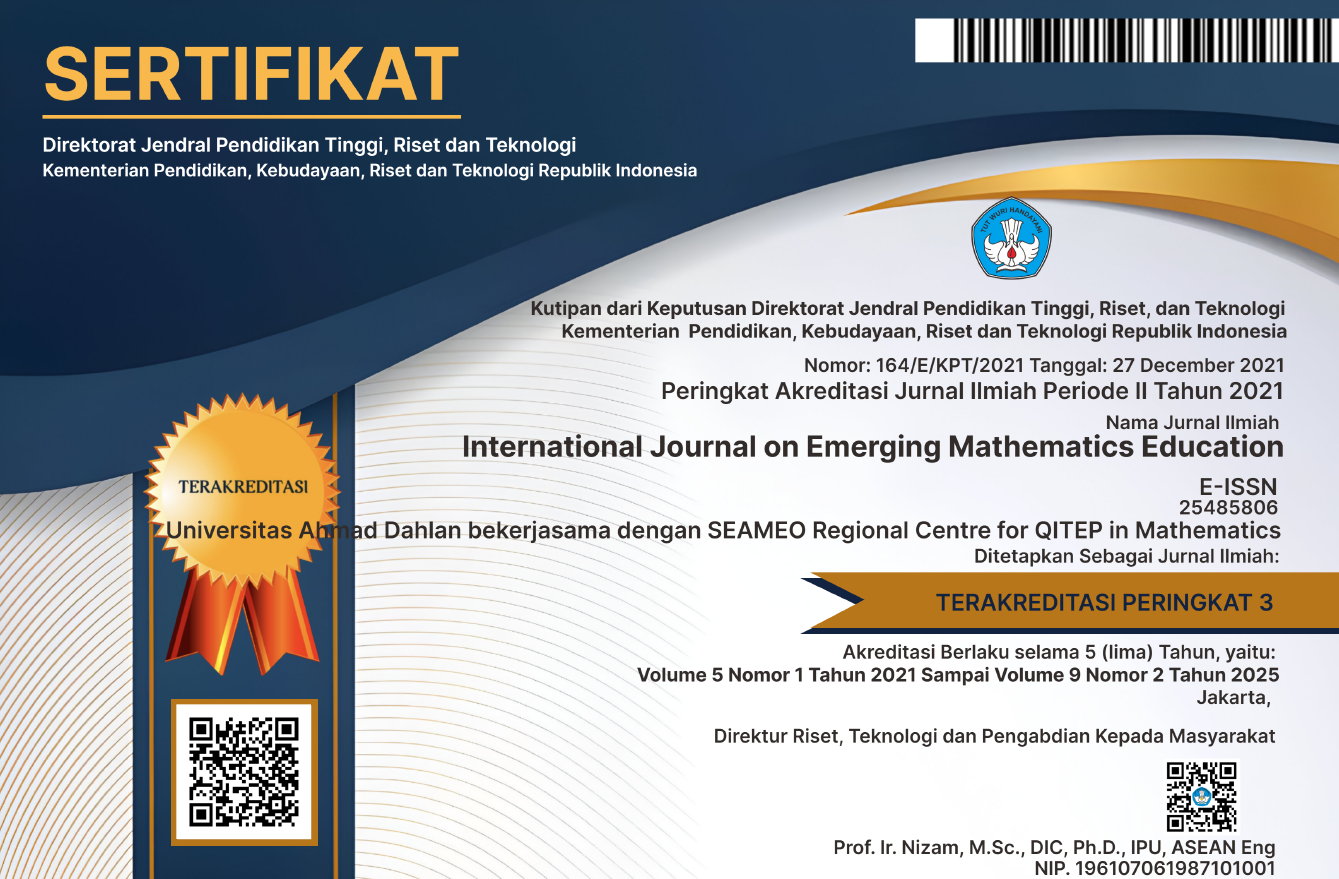Developing Mathematical Students Worksheet Based On Islamic Values Using Contextual Approach
DOI:
https://doi.org/10.12928/ijeme.v3i2.13286Keywords:
Mathematical Student Worksheet, 4D Model, Islamic Values, Contextual ApproachAbstract
Development of worksheets looks like the beginning of the problems found in schools, students have difficulty to understanding mathematical material both calculation concepts and moral values that have not been well organized. Worksheet designed with using a contextual approach which contains collaboration between material and verses relating to the used material, so that moral values related to the material are obtained and equipped with the application of moral values in the form of problem examples. After being designed, product is developed to be LKPD. The study objectives include: To develop a Mathematics LKPD based on Islamic values on the subject of algebraic. As a result of the study, the development of Student Worksheet (LKPD) based on Islamic values using a contextual approach to the subject of algebraic in class VII of the Qur'an Science Junior High School Minhajuth Thullab Pekalongan. The research uses the 4D development model consists of 4 main stages: Define, Design, Develop and Disseminate. The response of teachers to LKPD based on Islamic values with using a contextual approach on the subject of the algebra score 82% with very interesting criteria. The responses of students to LKPD obtained a score of 80 % with very decent criteria.References
Anggraini, W., Anwar, Y., and Madang, K.. (2016). Pengembangan Lembar Kerja Peserta Didik (LKPD) Berbasis Learning Cycle 7E Materi Sistem Sirkulasi Pada Manusia Untuk Kelas XI SMA. Jurnal Pembelajaran Biologi 3 (1).
Anwar, M.S. (2015). Efektifitas Pembelajaran PBL (Problem Based Learning) Terhadap Kemampuan Berpikir Kritis Dan Kreatif Siswa Materi Tiga Dimensi. Masters, Universitas Terbuka. http://repository.ut.ac.id/6912/.
Ayuningtyas, O. (2019). Interview Guru Matematika Kelas VII SMP Sains Qur’an Pekalongan.
Basuki, W.A., and Wijaya, A.. (2018). The Development of Student Worksheet Based on Realistic Mathematics Education. Yogyakarta: Yogyakarta State University.
Choirudin, (2015). Efektifitas Pembelajaran Matematika Dengan E-Learning Berbasis Schoology. Masters, Universitas Terbuka. http://repository.ut.ac.id/6907/.
———. (2017). Efektivitas Pembelajaran Berbasis Schoology. NUMERICAL: Jurnal Matematika dan Pendidikan Matematika, Desember, 101–26. https://doi.org/10.25217/numerical.v1i2.131.
Departemen Pendidikan Nasional. (2009). UU Sisdiknas No. 20 Tahun 2003. Jakarta: Sinar Grafika.
Katz, Sara, dan Moshe Stupel. (2015). Promoting Creativity and Self-Efficacy of Elementary Students through a Collaborative Research Task in Mathematics: A Case Study. Journal of Curriculum and Teaching 4 (1). https://doi.org/10.5430/jct.v4n1p68.
Lubis, M., and Zubaedi. (2013). Evaluasi Pendidikan Nilai. Yogyakarta: Pustaka Pelajar.
Munandar. (2015). Pengembangan Lembar Kerja Peserta Didik (LKPD) Berorientasi Nilai Islami Pada Materi Hidrolisis. Jurnal Pendidikan Sains Indonesia 03 (01): 27–37.
Mustafa. (2009). Filsafat Pendidikan Islam: Telaah Epistimologi Ilmu. Jurnal Iqra’ 3 (1).
Narbuko, C., dan Achmadi. A., (2014). Metode Penelitian. Jakarta: Bumi Aksara.
Ningsih, E. F. (2017). Proses Berpikir Mahasiswa dalam Pemecahan Masalah Aplikasi Integral Ditinjau dari Kecemasan Belajar Matematika (Math Anxiety). Iqra (Educational Journal) 1 (2): 191–217.
Omeri. (2015). Pentingnya Pendidikan Karakter Dalam Dunia Pendidikan. Manajer Pendidikan 9 (3).
Retnowati, E. Fathoni, Y., and Chen. O., (2018). Mathematics Problem Solving Skill Acquisition: Learning by Problem Posing or by Problem Solving. Cakrawala Pendidikan, Februari.
Shafa. (2014). Karakteristik Proses Pembelajaran Kurikulum 2013. Dinamika Ilmu, Samarinda: STAIN Samarinda 14 (1).
Sutarti, T., dan Irawan, E. (2017). Kiat Sukses Meraih Hibah Penelitian Pengembangan. Yogyakarta: Deepublish.
Syaifuddin. (2017). Pengembangan Lembar Kerja Peserta Didik (LKPD) Berbasis Kontekstual Untuk Meningkatkan Kemampuan Pemecahan Masalah dan Self-Efficacy Matematis. Lampung: Universitas Lampung.
Yusminah, H., dan Mushawwir, A. (2014). Pengaruh Penggunaan Lembar Kerja Peserta Didik Berbasis Pendekatan Ilmiah Terhadap Aktivitas dan Hasil Belajar IPA Biologi Kelas VII Peserta Didik SMP Negeri 2 Watampone.
Zakaria, Ismail, dan Kiu. (2015). Pengembangan Instructional Video Berbasis Multimedia Untuk Materi Sistem Koordinat. Prosiding Seminar Nasional Matematika dan Pendidikan Matematika, UMS.
Downloads
Published
How to Cite
Issue
Section
License
License and Copyright Agreement
In submitting the manuscript to the journal, the authors certify that:
- They are authorized by their co-authors to enter into these arrangements.
- The work described has not been formally published before, except in the form of an abstract or as part of a published lecture, review, thesis, or overlay journal. Please also carefully read the International Journal on Emerging Mathematics Education (IJEME) Author Guidelines at http://journal.uad.ac.id/index.php/IJEME/about/submissions#authorGuidelines
- That it is not under consideration for publication elsewhere,
- That its publication has been approved by all the author(s) and by the responsible authorities, tacitly or explicitly, of the institutes where the work has been carried out.
- They secure the right to reproduce any material that has already been published or copyrighted elsewhere.
- They agree to the following license and copyright agreement.
Copyright
Authors who publish with the International Journal on Emerging Mathematics Education (IJEME) agree to the following terms:
- Authors retain copyright and grant the journal the right of first publication with the work simultaneously licensed under a Creative Commons Attribution License (CC BY-SA 4.0) that allows others to share the work with an acknowledgment of the work's authorship and initial publication in this journal.
- Authors are able to enter into separate, additional contractual arrangements for the non-exclusive distribution of the journal's published version of the work (e.g., post it to an institutional repository or publish it in a book), with an acknowledgment of its initial publication in this journal.
- Authors are permitted and encouraged to post their work online (e.g., in institutional repositories or on their website) prior to and during the submission process, as it can lead to productive exchanges, as well as earlier and greater citation of published work.
![]()
Ciptaan disebarluaskan di bawah Lisensi Creative Commons Atribusi-BerbagiSerupa 4.0 Internasional.




